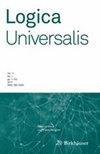下载PDF
{"title":"帕维尔·弗洛伦斯基的宗教对立理论","authors":"P. Rojek","doi":"10.1007/s11787-019-00234-0","DOIUrl":null,"url":null,"abstract":"","PeriodicalId":48558,"journal":{"name":"Logica Universalis","volume":"13 1","pages":"515 - 540"},"PeriodicalIF":0.4000,"publicationDate":"2019-11-01","publicationTypes":"Journal Article","fieldsOfStudy":null,"isOpenAccess":false,"openAccessPdf":"https://sci-hub-pdf.com/10.1007/s11787-019-00234-0","citationCount":"5","resultStr":"{\"title\":\"Pavel Florensky’s Theory of Religious Antinomies\",\"authors\":\"P. Rojek\",\"doi\":\"10.1007/s11787-019-00234-0\",\"DOIUrl\":null,\"url\":null,\"abstract\":\"\",\"PeriodicalId\":48558,\"journal\":{\"name\":\"Logica Universalis\",\"volume\":\"13 1\",\"pages\":\"515 - 540\"},\"PeriodicalIF\":0.4000,\"publicationDate\":\"2019-11-01\",\"publicationTypes\":\"Journal Article\",\"fieldsOfStudy\":null,\"isOpenAccess\":false,\"openAccessPdf\":\"https://sci-hub-pdf.com/10.1007/s11787-019-00234-0\",\"citationCount\":\"5\",\"resultStr\":null,\"platform\":\"Semanticscholar\",\"paperid\":null,\"PeriodicalName\":\"Logica Universalis\",\"FirstCategoryId\":\"94\",\"ListUrlMain\":\"https://doi.org/10.1007/s11787-019-00234-0\",\"RegionNum\":2,\"RegionCategory\":\"数学\",\"ArticlePicture\":[],\"TitleCN\":null,\"AbstractTextCN\":null,\"PMCID\":null,\"EPubDate\":\"\",\"PubModel\":\"\",\"JCR\":\"Q4\",\"JCRName\":\"LOGIC\",\"Score\":null,\"Total\":0}","platform":"Semanticscholar","paperid":null,"PeriodicalName":"Logica Universalis","FirstCategoryId":"94","ListUrlMain":"https://doi.org/10.1007/s11787-019-00234-0","RegionNum":2,"RegionCategory":"数学","ArticlePicture":[],"TitleCN":null,"AbstractTextCN":null,"PMCID":null,"EPubDate":"","PubModel":"","JCR":"Q4","JCRName":"LOGIC","Score":null,"Total":0}
引用次数: 5
引用
批量引用


